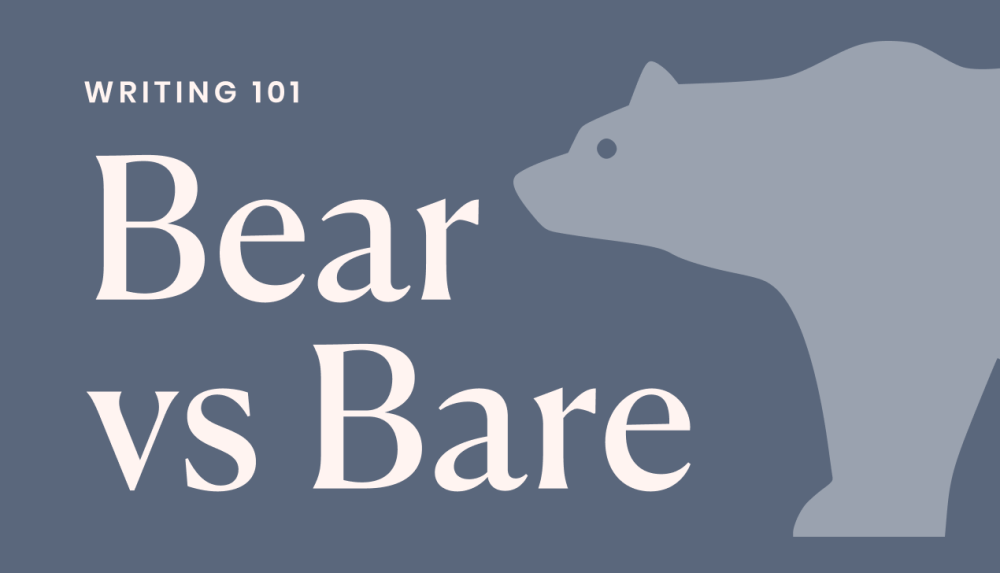
Words at work
– 6 min read
Bear with me vs. bare with me explained

Ever wondered what grizzly bears and being patient have in common with one another?
Not much, you might be thinking to yourself.
It turns out they have more in common than you might initially think.
Wait, what?
The noun bear and the verb to bear are two of the English language’s most famous homonyms.
Yes, that’s right. They’re part of that unique group of English words that sound and are spelled the same, but have different meanings.
What about bare and bear? As homophones, they sound the same, have distinct meanings, and are spelled differently.
Do you know when to use each spelling? How do you know when it’s appropriate to use the expression bear with me or bare with me?
When it comes to choosing the right word, it depends on the context of what you’re writing. In this post, we’ll help you remember the correct spelling so your writing always has a clear, intended meaning.

Which is correct — bear with me or bare with me?
Although we mentioned above that bear and bare have totally different meanings, it’s helpful to closely examine how and when you might use each word.
The verb bear means to tolerate or to endure something.
Bear with me is an expression that means to be patient or to hear someone out. It’s essentially a request for forbearance — a noun that means tolerance or self-control. Since it contains the word bear, it makes it easier to remember the correct expression.
Bare with me is in fact an incorrect spelling of the expression.
The verb to bare actually means to uncover or reveal something. Defined as lacking appropriate covering or clothing, the word bare means naked, undressed, or unclothed.
If you write the phrase bare with me, your readers may misunderstand your intentions.
Take a look at these examples for a correct and incorrect example of the phrase in action:

As for the phrase bear in mind, it’s used to ask someone to keep something in mind, “remember something”, “be aware” or “take something into account.”
What is the origin of bear with me?
To help you remember the right spelling for different contexts, it’s useful to dive into the origin of the expression.
People often think the phrase bear with me comes from Shakespeare’s work.
In the Shakespear play, “Julius Caesar”, we hear Antony utter the infamous words, “Bear with me; My heart is in the coffin there with Caesar.”
While the idiom can be found in Shakespeare’s works, he didn’t invent the expression — its use is simply a reflection of contemporary speech during the Elizabethan era.
To bear is actually an old verb meaning to carry, with a connection to Greek pherein and Latin ferre.
The idiom takes its root from asking someone to carry the burden of being patient until they reach their destination. These days, in colloquial speech, you might hear someone say “bear with me” as they finish telling a story or stand in line looking for their debit card.
It’s easy to get the spelling of bear with me wrong
As we touched upon it earlier, bear and bare are words that sound the same but have different spellings and distinct meanings, making them easy to misspell.
You may have heard the phrase in conversation but never seen it written down.
Given that they sound the same, it’s a common misspelling to make, so you may have seen it incorrectly spelled on the internet.
Since the noun bear defines a large, hairy mammal, people often forget about the verb to bear. They think to themselves, surely this sentence has nothing to do with a grizzly bear and they choose the other word bare.
But bare as an adjective is defined as lacking clothing or being uncovered. As a verb, it means to uncover or to expose.
How to remember the spelling of bear with me
The next time you have to remember the correct spelling of the phrase, think about the big, furry animal — grizzly bears.
Since the verb to bear means to endure, support, or carry, remember that bears do just that.
Imagine a grizzly bear who’s able to endure living in harsh outdoor conditions and strong enough to carry heavy things like the animals it eats.
If you still can’t remember the correct way of spelling it, just imagine the look on your readers’ faces if you were to ask them to remove their clothing.
That’s right, depending on what you’re writing, you may get a few raised eyebrows.
Asking someone to bare with you literally means asking them to reveal, undress, or uncover themselves. Unless you’re writing some saucy erotic fiction, it probably isn’t the intended meaning of your words!
One last thing: what can I say instead of bear with me?
Are you still puzzled? If you’re worried about making a writing faux pas, play it safe and opt for a synonym.
Depending on the context of what you’re saying, you could ask someone to be patient, wait, make an allowance, endure, or put up with something.
Here are some alternatives to saying bear with me:
• The presenter asked the audience to hold on while he searched for his script.
• Please wait a moment while I process your refund.
• The teacher asked the children to be patient with him while he announced the test results.
• Could you make an allowance just this once and I’ll meet the deadline next time?
Always remember patient bears and their ability to endure wild living. If that fails, just think about the shocked expressions on your readers’ faces if you were to ask them to undress.
Looking to take your writing to the next level? Start a free trial to see the benefits of Writer, and never make a writing faux pas again.






